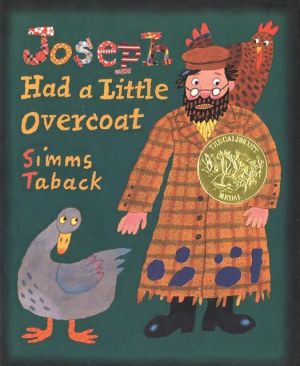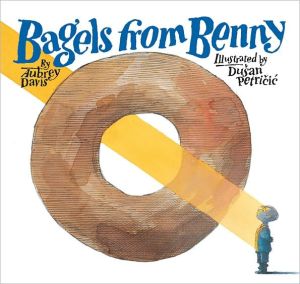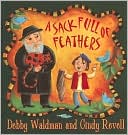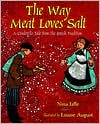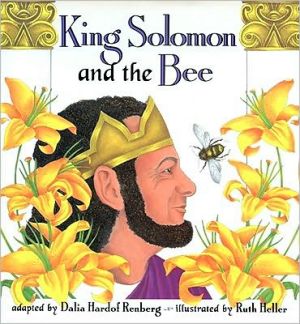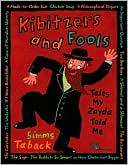In God's Hands
Search in google:
\ Lori SmithA retold Jewish folk tale that will also appeal to Catholic and Protestant readers, liberal and conservative…This simple story, with earth-tone illustrations by Matthew J. Baek, is a welcome antidote to the grand holiday tradition of accumulating material things. It will help small hearts understand that some families are in need and that we have the great privilege of serving them as "hands of God."\ —The Washington Post\ \ \ \ \ Publishers WeeklyA miracle connects two very different men in this uplifting tale inspired by Jewish legend. Jacob, a rich man preoccupied with increasing his wealth, and David, a poor man worried about feeding his hungry family, unknowingly cross paths at the synagogue. One day at services, Jacob hears words from the Book of Leviticus--a command from God to bake loaves of challah--and takes the verse to heart. Jacob then leaves his offering of fresh-baked bread at the synagogue, where it is found by David and thought to be the tangible answer to his prayers. The same ritual repeats week after week until the rabbi unravels the mysterious bread exchange and encourages the men to keep it up, as their hands are extensions of God's hands, doing His work. Kushner (The Book of Miracles) and Schmidt's (Lizzie Bright and the Buckminster Boy) narrative unwinds with a crisp rhythm. Baek's children's book debut features gently stylized paintings in dusty earth and jewel tones that exude a timeless feel appropriate for this accessible outing. Ages 5-up. (Aug.) Copyright 2005 Reed Business Information.\ \ \ Children's LiteratureThe phrase "the hands of God" evokes images like the awe in the Sistine Chapel, but in the words of these authors, God's hands are quite down to earth. Almost a folktale, this is the story of two men whose lives are strangely intertwined in their small town. Jacob is a rich man who habitually sleeps through the synagogue services. David is a poor man who daily sweeps and dusts the synagogue to earn a meager living for his family. One day Jacob is startled awake by a message from God read by the rabbi from the book of Leviticus. "You shall bake twelve loaves of challah bread and set them before Me," Jacob hears God say to him. He obeys God, bakes the bread, takes it to the synagogue and places it in the holy ark. David goes to the synagogue praying earnestly for food for his hungry children. He opens the ark, finds the bread and is overjoyed by God's answer to prayer. Week after week the scenario is repeated, each man convinced that God is at work in his life until one day the rabbi happens to witness the whole amazing thing. The story ends in a most satisfactory fashion. How wonderful to discover that God's hands are at the ends of our own arms. Baek's illustrations enhance the action of the tale and, by their details, open doors for non-Jewish readers teaching about the synagogue, its ark, Torah, lamp, and menorah. This is a book for all cultures and religious beliefs, and it is great fun as well. 2005, Jewish Lights Publishing, Ages 5 up. \ —Mildred Hart\ \ \ \ \ School Library JournalK-Gr 3-Jacob, a rich man, always falls asleep in synagogue, but one day he wakes up just in time to hear the words of Leviticus read: "`You shall bake twelve loaves of challah, and set them before Me in two rows, six in each row.'" He is certain that God is talking directly to him, so he hurries home and quickly bakes 12 loaves of bread. He brings them to the synagogue and places them in the Holy Ark. David, the poor caretaker, discovers the loaves and believes that they were sent from God to answer his prayers for food to feed his family. Over the years, "Jacob's giving and David's receiving" become routine. When the rabbi discovers the two men and reveals to them what has been happening, they both learn how their hands have become God's hand in creating a miracle. Based on a traditional folktale, Kushner and Schmidt's retelling is greatly enhanced by Baek's detailed illustrations in deep blues and earth colors. Similar to Aubrey Davis's Bagels from Benny (Kids Can, 2003), this version follows the original more closely and has a slightly more sophisticated message.-Rachel Kamin, Temple Israel Libraries & Media Center, West Bloomfield, MI Copyright 2005 Reed Business Information.\ \ \ \ \ Kirkus ReviewsWealthy Jacob is concerned with ways to make more money but routinely falls asleep during the Rabbi's weekly Sabbath service. Less fortunate David, the caretaker of the synagogue, worries each week about his empty cupboards and hungry children. During one service, Jacob awakens long enough to hear the Torah portion from the Book of Leviticus where God instructs Moses to bake 12 loaves and set them before him in equal rows of six, each Sabbath day. Thinking God has spoken to him alone, Jacob goes home, bakes 12 loaves of challah and returns to the synagogue placing the loaves within the holy ark. Later, as David cleans up, he prays before the ark for his starving family. Opening it, he finds the challahs and rejoices for his answered prayers. The routine continues for several years until the wise Rabbi catches both men in their respective rituals and explains their lives are connected by their actions, not by God's direction: "your hands are God's hands." As in the child-oriented Bagels from Benny by Aubrey Davis (2003), discussable themes of goodwill and kindness resonate throughout. The nearly full-page, folk-style, expressive paintings, compliment the sensitively told story. A worthy choice for all collections. (Picture book. 5-9)\ \

